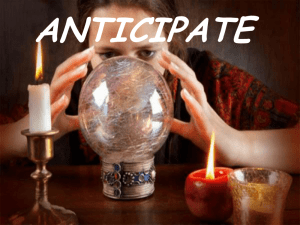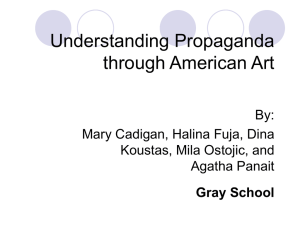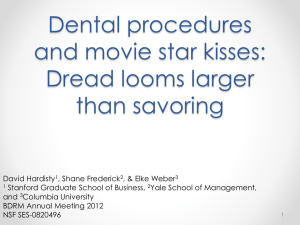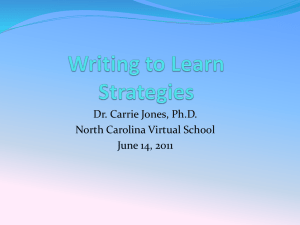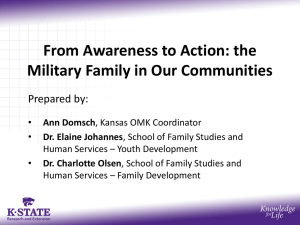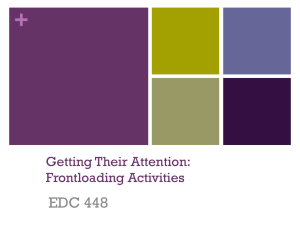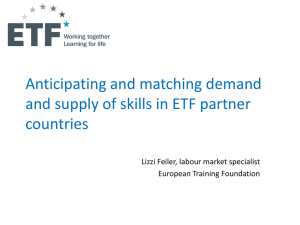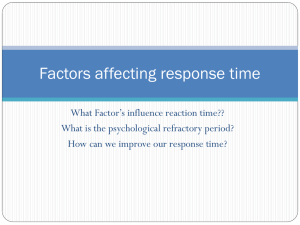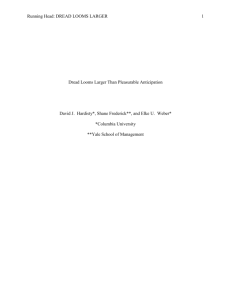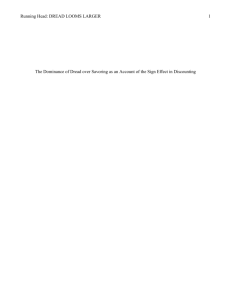Dread looms larger than pleasurable anticipation
advertisement
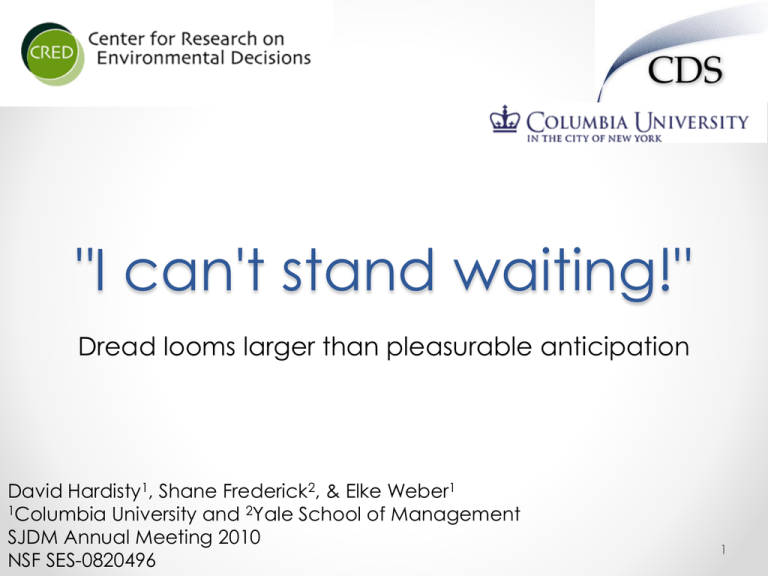
"I can't stand waiting!" Dread looms larger than pleasurable anticipation David Hardisty1, Shane Frederick2, & Elke Weber1 1Columbia University and 2Yale School of Management SJDM Annual Meeting 2010 NSF SES-0820496 1 Co-Authors Shane Frederick Elke Weber Super Awesome! 2 Scheduling a dental procedure • Discounting • Anticipation 3 Scheduling a vacation • Discounting • Anticipation 4 Research on anticipation • Loewenstein (1987): - anticipation reduces discounting - especially at short delays - especially for brief, highly “imaginable” events • Harris (2010): - vivid losses (bee sting, embarrassment, rejection) often preferred sooner - dread was stronger at shorter delays 5 Pilot studies: eating worms and kissing movie stars • Dread: 20 out of 56 students preferred eating 9 worms today rather than 8 next week • Savoring: Only 6 out of 103 students would pay more for a kiss next week than one today • Does dread loom larger? 6 Explaining the “Sign Effect” • Sign effect: losses are discounted less than gains (Thaler, 1981; Hardisty & Weber, 2009) • Translation: we want gains now more strongly than we want to postpone losses • Why? Dread makes us want to get losses over with immediately 7 Study 1: Overview • Convenience sample of 120 students and online participants • Participants brainstormed events, and then rated the anticipation values • 2x2 between-subjects design: sign X delay 8 Study 1: Examples of Positive Events Prefer now: •“going out with friends” •“getting a package in the mail” •“get paid for doing a survey” Prefer later: •“hawaii vacation” •“Christmas shopping” •“eating a great dessert” 9 Study 1: Examples of Negative Events Prefer now: •“going to the dentist” •“paying bills” •“visit the inlaws” Prefer later: •“Serious Illness” •“paying taxes” •“bathing our cats” 10 “If this thing were one week away, how would you feel about anticipating it?” mean anticipation value 3.00 2.00 1.00 sooner later .00 -1.00 -2.00 -3.00 negative events positive events 11 interaction: F(1,113)=5.6, p=.02 Anticipation: what do we call it? Pleasurable Anticipation Aversive Anticipation Positive Event Negative Event 12 Anticipation: what do we call it? Pleasurable Anticipation Positive Event Aversive Anticipation Savoring Negative Event 13 Anticipation: what do we call it? Positive Event Pleasurable Anticipation Aversive Anticipation Savoring Impatience Negative Event 14 Anticipation: what do we call it? Positive Event Negative Event Pleasurable Anticipation Aversive Anticipation Savoring Impatience Dread 15 Anticipation: what do we call it? Pleasurable Anticipation Aversive Anticipation Positive Event Savoring Impatience Negative Event ??? Dread 16 Study 1: Discussion Anticipation of negative events: negative Anticipation of positive events: mixed But does this predict time preference? …even when controlling for event magnitude? • How does the pattern change over time? • • • • 17 Study 2: Overview • National sample of 169 participants • 20 intertemporal choice scenarios (10 gain, 10 loss) • Measured anticipation utility, experience utility, and time preference • Delay manipulated between subjects: 3 days, 1 week, 1 month, 1 year, or 5 years 18 Study 2: Events Some Positive Events: •receiving a $50 check •spending time with your best friend •winning the lottery Some Negative Events: •paying a $50 fine •a confrontation with your co-worker or family member •having one of your legs amputated 19 Study 2: Stimulus Please imagine the following event: [receiving a $50 check] 1.Assuming this event would definitely happen to you and you knew it were coming, when would you prefer it to happen? immediately OR don’t care when OR [one month] from now 2.If this event were to happen to you [one month] from now, how positive or negative would the event be at that time? extremely negative neutral extremely positive |-------------------------------------|-------------------------------------| 3.If this event were [one month] away, how psychologically pleasurable or unpleasurable would the anticipation be? In other words, how would you feel while waiting for it? strongly dislike the strongly like the feeling of waiting neutral feeling of waiting |-------------------------------------|-------------------------------------| 20 Results: Time preference Negative Events Positive Events Now 41% 62% Indifferent 22% 31% Later 37% 7% Total N=5,420 events (20 events for each of 169 participants) 21 The “sign effect” Negative Events Positive Events Now 41% 62% Indifferent 22% 31% Later 37% 7% Total N=5,420 events (20 events for each of 169 participants) 22 Negative time preference Negative Events Positive Events Now 41% 62% Indifferent 22% 31% Later 37% 7% Total N=5,420 events (20 events for each of 169 participants) 23 Ratings of experience utility and anticipation utility 100 80 60 utility 40 20 negative positive 0 -20 -40 -60 -80 -100 experience utility anticipation utility 24 Anticipation and experience over time experiencing good experiencing bad Mean Rating 100 50 0 -50 -100 three days one week one month one year five years Event Delay Anticipation and experience over time experiencing good experiencing bad anticipating good anticipating bad Mean Rating 100 50 0 -50 -100 three days one week one month one year five years Event Delay Study 2 Results: associations • For all 20 events, anticipation and experience utility were modestly correlated, average r = .36 • For all 20 events, anticipation utility negatively predicted “now” preference, average standardized slope = -.30 27 Anticipation predicts time preference percent choosing to have the vacation now 100 90 80 70 60 50 40 30 20 10 0 -80 -40 0 40 anticipation utility of vacation 80 Differences between items • Significant heterogeneity • Example: leg amputation -most dreaded -yet most postponed Summary • Dread is more common than savoring - anticipation of losses is negative -anticipation of gains can be positive or negative • Anticipation value predicts time preference • Together, this may explain the “sign effect” 30 Future Directions • Explaining between-item differences • Effect of uncertainty on anticipation • Gain/loss tradeoffs 31 Special Thanks To… • The National Science Foundation (SES-0820496, SES0345840, and Graduate Research Fellowship) • The Center for Research on Environmental Decisions (CRED) • The Center for Decision Sciences (CDS) 32 Thank You! 33 References Hardisty, D. J. & Weber, E. U. (2009). Discounting future green: Money vs the environment. Journal of Experimental Psychology: General, 138(3), 329-340. Harris, C. R. (2010). Feelings of dread and intertemporal choice. Journal of Behavioral Decision Making, n/a. doi: 10.1002/bdm.709 Loewenstein, G. (1987). Anticipation and the valuation of delayed consumption. The Economic Journal, 97, 666-684. McGraw, A. P., Larsen, J. T., Kahneman, D. & Schkade, D. A. (2010). Comparing gains and losses. Psychological Science. Thaler, R. H. (1981). Some empirical evidence on dynamic inconsistency. Economics Letters, 8, 201- 34 207. Extra Slides 35 Study 2: Events Positive Events: • receiving a $50 check • receiving a good grade or performance review • spending time with your best friend • improved energy and health for 10 days • a free 5-day vacation to the destination of your choice • watching your favorite TV show or reading a good book for an hour • getting a gift in the mail from a family member • eating a nice meal out at a restaurant • winning the lottery • a kiss from the movie star of your choice Negative Events: • paying a $50 fine • receiving a bad grade or performance review • a confrontation with your coworker or family member • being sick for 10 days • doing difficult home cleaning and renovation for 5 days • filling out paperwork and waiting around for an hour at the local Department of Motor Vehicles (DMV) • giving a stressful 60 minute improvised speech • a painful dental procedure • having one of your legs amputated • getting twenty painful (but harmless) electric shocks in a research experiment 36 Typical Event Pair Event Anticipation Experience Choice (1=prefer now) Regression Beta receiving a good grade or performance review 21 68 .68 -.22** receiving a bad grade or performance review -55 -65 .15 -.38** 37 Differences between items • “Doing difficult home cleaning and renovation for 5 days” anticipation: -19 percent choosing now: 38% beta: -.36** • “Having one of your legs amputated” anticipation: -63 percent choosing now: 19% beta: -.24** event a e Corr(a,e) c beta (a) beta (e) a free 5-day vacation to the destination of your choice 28 75 .27** .19 -.40** .00 eating a nice meal out at a restaurant 28 59 .42** .29 -.31** .15 a kiss from the movie star of your choice 22 46 .38** .32 -.17* .34** receiving a good grade or performance review 21 68 .33** .68 -.22** -.01 getting a gift in the mail from a family member 21 64 .43** .49 -.35** .15 spending time with your best friend 21 67 .24** .44 -.21** .14 watching your favorite TV show or reading a good book for an hour 13 52 .39** .57 -.27** .18* receiving a $50 check 13 66 .25** .78 -.17* .04 improved energy and health for 10 days 9 67 .24** .69 -.31** .12 winning the lottery 6 83 .20* .79 -.31** .15* doing difficult home cleaning and renovation for 5 days -19 -13 .51** .02 -.36** .32** filling out paperwork and waiting around for an hour at the local Department of Motor Vehicles (DMV) -26 -35 .43** .11 -.30** .26** paying a $50 fine -27 -39 .39** .02 -.28** .16 giving a stressful 60 minute improvised speech -45 -37 .45** -.10 -.20* .26** being sick for 10 days -47 -65 .28** -.15 -.32** .22** a painful dental procedure -53 -63 .37** .18 -.44** .39** receiving a bad grade or performance review -55 -65 .43** .15 -.38** .31** a confrontation with your co-worker or family member -57 -60 .55** .18 -.35** .32** getting twenty painful (but harmless) electric shocks in a research experiment -58 -66 .41** .13 -.36** .33** having one of your legs amputated -63 -86 .31** -.56 -.24** .33** Study 1: Proportion of events classified by participants as provoking dread, pleasurable anticipation, or neither, depending on what type of events participants had generated (positive events vs negative events that they would prefer to happen immediately vs later). Total N = 433 events. Positive Event Classification Negative Event Prefer Now Prefer Later Prefer Now Prefer Later Average Negative Anticipation 74% 22% 75% 63% 58% Neutral Anticipation 15% 14% 13% 18% 15% Positive Anticipation 11% 64% 12% 19% 27% Total 100% 100% 100% 100% 100% 40 Histogram of Vacation Experience Utility Histogram of Vacation Anticipation Utility Histogram of Dentist Experience Utility Histogram of Dentist Anticipation Utility
